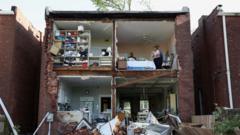Residents of St. James Parish are facing legal hurdles against a Louisiana law that limits the utilization of air pollution data gathered from low-cost monitors. This legislation has sparked a federal lawsuit as community members assert their constitutional right to inform others about air quality issues affecting their health.
Legal Battle Erupts Over Air Pollution Data Rights in Louisiana

Legal Battle Erupts Over Air Pollution Data Rights in Louisiana
Community groups in Louisiana challenge a law restricting the use of air quality data, citing free speech violations as they fight for environmental justice.
In St. James Parish, a region notoriously known as “Cancer Alley” along the Mississippi River, community activists have mobilized around low-cost air pollution monitors since 2022, seeking to understand and combat the environmental threats they face. However, a controversial Louisiana law enacted in 2022 has placed significant restrictions on how this data can be used, effectively complicating efforts to advocate for stricter pollution regulations.
The new legislation prohibits residents from using the information collected from budget-friendly air quality monitors to justify demands for enhanced enforcement of clean air standards; instead, it mandates the use of pricey monitors that comply with stringent Environmental Protection Agency (EPA) specifications. Noncompliance with the law could result in hefty fines, reaching thousands of dollars daily.
In response to these restrictions, local organizations have taken legal action, filing a federal lawsuit against the state government, asserting that this measure infringes on their constitutional rights to free speech. Caitlion Hunter, who serves as the director of research and policy at RISE St. James—one of the leading groups in the air-monitoring initiative—stated that the law essentially allows polluting industries to undermine scientific findings.
As a pioneering legal measure, Louisiana's law has prompted similar discussions in other states; Kentucky recently implemented its own version, and West Virginia considered a comparable bill earlier this year, although it did not pass.
Both the Louisiana Department of Environmental Quality and Attorney General Liz Murrill have refrained from making comments on the ongoing legal battle, leaving the situation and its implications for community health in a state of uncertainty. The outcome of this lawsuit is likely to hold considerable weight, not only for Louisiana residents but also for the broader conversation regarding environmental justice and the rights of communities to assess and advocate for their health.





















